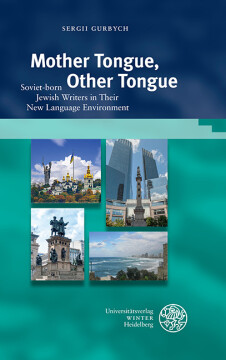
BUCH
Mother Tongue, Other Tongue
Soviet-born Jewish Writers in Their New Language Environment
Beiträge zur slavischen Philologie, Bd. 23
2021
Zusätzliche Informationen
Bibliografische Daten
Abstract
The book examines the works of authors – e. g. Katja Petrowskaja, Alex Epstein, Alona Kimhi, Gary Shteyngart and Lara Vapnyar – who, after immigration from post-Soviet countries, created fiction in the Language of their host countries (Germany, Israel, United States). Considering the works of these writers, the study focuses on the elements of cultural identity and analyzes ways of transmitting the cultural codes of the writer’s native culture to the reader who was raised in another culture. Unlike many studies on this topic, the author assumes that Soviet, rather than Russian, culture is the native one for the authors in question. After immigration, they develop a hybrid cultural identity; this allows analyzing their texts in terms of transculturalism. All novels are viewed in terms of the Reader Response Criticism. Within the framework of the transcultural approach, each of the authors in question is considered in certain aspect that is most characteristic of his or her work.
Inhaltsverzeichnis
| Zwischenüberschrift | Seite | Aktion | Preis |
|---|---|---|---|
| Cover | Cover | ||
| Titel | 3 | ||
| Imprint | 4 | ||
| Table of Contents | 5 | ||
| Acknowledgments | 7 | ||
| Introduction | 9 | ||
| Chapter 1. Methodology and Research Material | 21 | ||
| 1.1. Research Material | 21 | ||
| 1.2. The main concepts | 31 | ||
| 1.2.1. Transculturality | 31 | ||
| 1.2.2. Transculturalism and literature | 34 | ||
| 1.2.3. Transculturalism and translingualism | 38 | ||
| 1.2.4. National, social, and cultural identity | 42 | ||
| 1.2.5. The implied reader | 48 | ||
| 1.3. The focus and methodology of the research | 51 | ||
| Chapter 2. Going beyond the norms in Hebrew-language literature | 55 | ||
| 2.1. General background | 55 | ||
| 2.2. Boris Zaidman: a sociolinguistic analysis of the novel | 58 | ||
| 2.3. Micro-narratives by Alex Epstein and the tradition of literary nonsense | 75 | ||
| 2.4. Alona Kimhi’s critical approach to the concept of social and cultural norms | 91 | ||
| 2.4.1. Biography and general overview of Kimhi’s oeuvre | 91 | ||
| 2.4.2. ‚Nightmare Poem‘ | 95 | ||
| 2.4.3. ‚Weeping Susannah‘ | 100 | ||
| 2.4.4. ‚Lily la Tigresse‘ | 107 | ||
| Chapter 3. English-language immigrant literature: Overcoming ethnic stereotypes | 117 | ||
| 3.1. General background | 117 | ||
| 3.2. Lara Vapnyar: An immigrant between the Past and the Present | 123 | ||
| 3.3. Gary Shteyngart: mocking cultural stereotypes | 129 | ||
| 3.3.1. ‚The Russian Debutante’s Handbook‘ | 133 | ||
| 3.3.2. ‚Absurdistan‘ | 140 | ||
| 3.3.3. ‚Super Sad True Love Story‘ | 146 | ||
| Chapter 4. Interweaving of cultural codes in German migrant fiction | 157 | ||
| 4.1. General background | 157 | ||
| 4.2. Katja Petrowskaja and the concept of postmemory | 167 | ||
| 4.3. Olga Grjasnowa’s characters: Between Jewish and Muslim worlds | 183 | ||
| 4.4. Alina Bronsky: social life inside and outside the migrant neighborhood | 197 | ||
| Conclusion | 209 | ||
| Bibliography | 213 | ||
| Backcover | Backcover |


 Publishing Platform by CloudPublish
Publishing Platform by CloudPublish